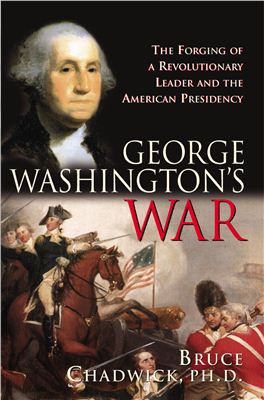Naperville: Sourcebooks, Inc., 2005. - 576 р.
Book Description
The American Revolution was won not on the battlefields, but in the mind of George Washington. A compulsively readable narrative and extensive history, George Washington's War illuminates how during the war's winter months the young general created a new model of leadership that became the model for the American presidency.
Editorial Reviews
From Publishers Weekly
Instead of offering a chronicle of maneuver and combat, this illuminating if deferential biography examines Washington’s far more trying difficulties off the battlefield. Historian Chadwick (The Reel Civil War: Mythmaking in American Film) focuses on the Continental Army’s travails during its winter encampments—not just the Valley Forge epic, but equally dire experiences at Morristown, N.J., during the winters of 1776-7 and 1779-80, which were a test of Washington’s political and administrative talents. Supplies had to be wheedled out of a do-nothing Continental Congress, fractious state govements and tight-fisted local farmers; hospitals and inoculations had to be supervised; recruits had to be trained—or at least persuaded not to mutiny over back pay or go home when their brief enlistments expired. Through it all, Chadwick says, Washington walked a tightrope between imposing the authoritarian measures needed to keep the Revolution alive and protecting the liberties it upheld. The author portrays Washington’s wartime experience as a schooling in democratic leadership, one that imparted truths about federalism and the need for a strong national govement and Executive Branch that he would champion in the 1787 Constitution, as well as managerial precepts he would apply during his Presidency. At times, Chadwick’s admiration borders on reverence: he puts the best possible face on Washington’s ambivalence toward slavery, and is smitten with contemporary accounts of his "graceful" gestures and "majestic" walk. But Chadwick’s emphasis on logistics, organization and politics gives a more realistic view of the Revolutionary War than the usual narrative of campaigns and battles, and a more convincing measure of Washington’s achievement in leading it.
Book Description
The American Revolution was won not on the battlefields, but in the mind of George Washington. A compulsively readable narrative and extensive history, George Washington's War illuminates how during the war's winter months the young general created a new model of leadership that became the model for the American presidency.
Editorial Reviews
From Publishers Weekly
Instead of offering a chronicle of maneuver and combat, this illuminating if deferential biography examines Washington’s far more trying difficulties off the battlefield. Historian Chadwick (The Reel Civil War: Mythmaking in American Film) focuses on the Continental Army’s travails during its winter encampments—not just the Valley Forge epic, but equally dire experiences at Morristown, N.J., during the winters of 1776-7 and 1779-80, which were a test of Washington’s political and administrative talents. Supplies had to be wheedled out of a do-nothing Continental Congress, fractious state govements and tight-fisted local farmers; hospitals and inoculations had to be supervised; recruits had to be trained—or at least persuaded not to mutiny over back pay or go home when their brief enlistments expired. Through it all, Chadwick says, Washington walked a tightrope between imposing the authoritarian measures needed to keep the Revolution alive and protecting the liberties it upheld. The author portrays Washington’s wartime experience as a schooling in democratic leadership, one that imparted truths about federalism and the need for a strong national govement and Executive Branch that he would champion in the 1787 Constitution, as well as managerial precepts he would apply during his Presidency. At times, Chadwick’s admiration borders on reverence: he puts the best possible face on Washington’s ambivalence toward slavery, and is smitten with contemporary accounts of his "graceful" gestures and "majestic" walk. But Chadwick’s emphasis on logistics, organization and politics gives a more realistic view of the Revolutionary War than the usual narrative of campaigns and battles, and a more convincing measure of Washington’s achievement in leading it.

